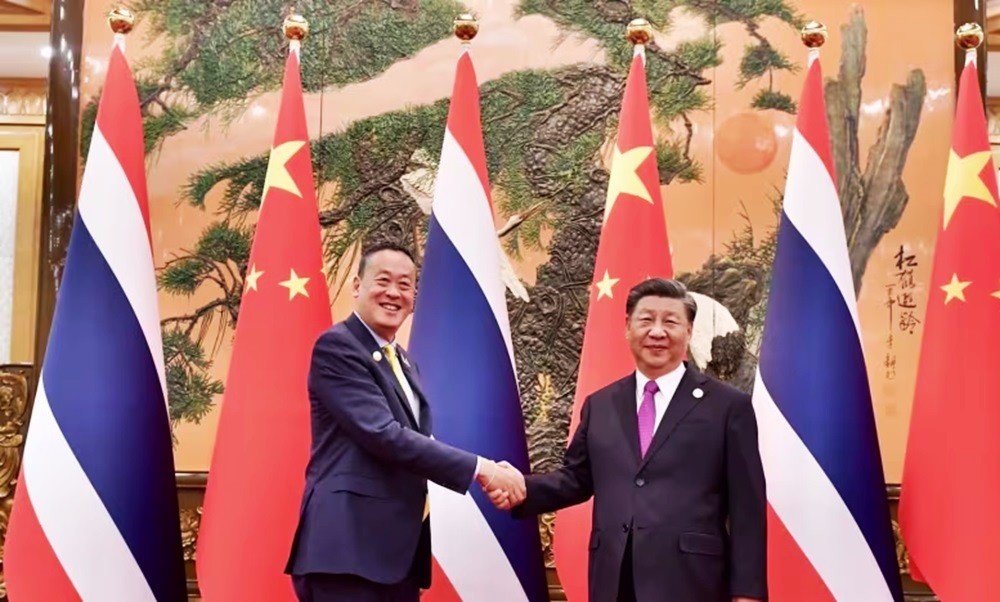Thailand and China have announced a historic tourist partnership. Both countries have agreed to permanently remove visa restrictions for citizens of the other country, which will take effect in March.
Thai Prime Minister Srettha Thavisin addressed this momentous development, emphasizing the reciprocal benefits that it will offer to both countries. According to reports, Thailand took moves to enhance its tourism business in September by dismissing visas for Chinese nationals.
The original visa waiver for Chinese citizens was a huge success, especially as Thailand was seeing a decline in Chinese tourist visitation.
However, more than 22,000 Chinese visitors entered Thailand in the first two days of the waiver, indicating a good impact of the program.
Prime Minister Srettha emphasized his enthusiasm for welcoming tourists from both countries, emphasizing Thailand’s readiness to open its doors and assure visitors’ safety.

Prime Minister Srettha described the visa waiver as a ‘improvement’ to Thailand-China relations, and emphasized the positive impact on the value of Thai passports. Chinese tourists are currently the second-largest group of international visitors to Thailand, after only Malaysians.
Despite the positive prognosis, Thailand’s tourist landscape has encountered hurdles, including a shortage of low-cost flights following COVID-19 and a slowing Chinese economy.
Concerns about safety have also been raised, driven by reports of tourists being kidnapped and forced to work at scam centers in neighboring countries.
Thailand’s Tourism Authority established a target of luring up to 3.5 million Chinese visitors in 2023, falling short of its 4 million target.
This prediction, however, indicates a huge increase over the modest 270,000 Chinese tourists received in 2022. Looking ahead, the tourism authority has set an ambitious aim of 8.2 million Chinese tourists for 2024.

Notably, China has actively waived visa requirements in order to attract tourists. The country announced a visa-free experiment for travelers from various European nations and Malaysia in November, with the goal of encouraging international tourism.
This initiative, which began in December, will run until the end of November this year.
The reciprocal visa waivers between Thailand and China are part of a larger trend of countries using similar measures to boost tourism and strengthen diplomatic ties.
On the other hand, if the visa waiver encourages tourism in Thailand and China at the expense of other countries, including India, the Indian tourism industry may face issues. And, in order to do so, Indian authorities may need to reconsider their strategy for attracting and retaining overseas tourists.
Furthermore, because India has regional relations with both China and Thailand, the visa waiver is anticipated to encourage increased tourism between these two nations, perhaps leading to regional economic growth and collaboration.
With this, India may encounter difficulties in preserving or increasing its proportion of international tourists in the region.
Thailand-China relations have grown dramatically in recent years, with growing economic collaboration and diplomatic links. Thailand’s strategic location, as well as China’s ambitious Belt and Road Initiative, have pushed the two countries to work more closely together.
Thailand’s greatest trading partner is now China, with bilateral trade reaching record heights. Furthermore, Chinese investment in infrastructure projects in Thailand has increased, strengthening the relationship between the two countries.
Despite periodic difficulties and worries, Thailand-China relations are trending toward greater dependency and mutual benefit.
Thailand and China relations are generally positive and characterized by diplomatic cooperation, economic ties, and cultural exchanges. Both countries have a long history of diplomatic relations, and they maintain a strategic partnership.
Key aspects of Thailand-China relations include:
Economic Cooperation: China is one of Thailand’s largest trading partners. The two countries have engaged in various economic initiatives, including infrastructure projects and trade agreements. The Belt and Road Initiative (BRI) has played a significant role in strengthening economic ties.
Infrastructure Projects: China has been involved in several major infrastructure projects in Thailand, such as the construction of high-speed railways and the development of the Eastern Economic Corridor (EEC), a key economic zone in Thailand.
Tourism: China is a significant source of tourism for Thailand. Millions of Chinese tourists visit Thailand each year, contributing significantly to the country’s tourism industry.
Cultural and Educational Exchanges: Both countries promote cultural and educational exchanges to enhance mutual understanding. There are various programs and initiatives to facilitate cooperation in areas such as education, science, and technology.
Political Relations: Diplomatic relations between Thailand and China have been generally stable. The two countries often coordinate on regional and international issues.











